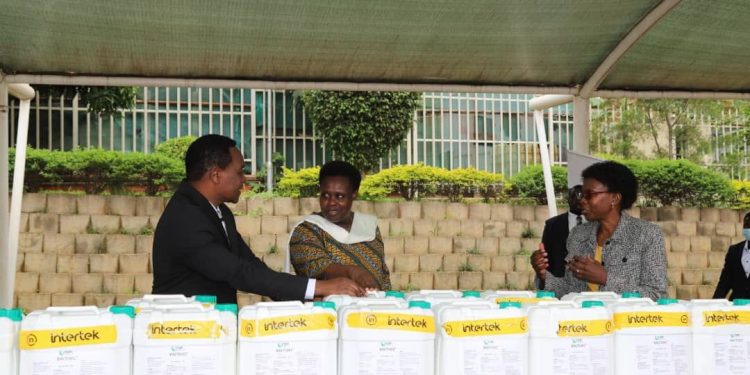Uganda has received a significant boost in its fight against malaria with the arrival of 1,000 litres of biolarvicide, a mosquito-killing chemical donated by Tanzania.
This strategic intervention aims to curb the spread of malaria by eliminating mosquito larvae before they mature into disease-transmitting adults.
The donation, a product of diplomatic discussions between Uganda’s Vice President Jessica Alupo and Zanzibar’s President Dr. Hussein Ali Mwinyi, was first proposed during the G77 + China Summit in Cuba last year.
Alupo, representing President Museveni at the summit, advocated for Uganda to adopt Tanzania’s advanced mosquito control strategies. This collaboration has now materialized with the first shipment of biolarvicide delivered to Uganda’s Ministry of Health.
During the handover, Vice President Alupo expressed Uganda’s deep appreciation for Tanzania’s gesture. “By reducing mosquito populations, we’re not just fighting malaria but also other dangerous diseases they carry,” she stated.
She also reminded Ugandans to utilize the recently introduced malaria vaccine for children under five as an additional layer of protection.
Uganda continues to battle a high malaria burden, ranking third globally for malaria cases and seventh for malaria-related deaths, according to the World Malaria Report 2023. The disease remains a leading cause of illness, straining healthcare systems, increasing medical expenses, and reducing productivity across the country.
Health Minister Dr. Ruth Aceng acknowledged the ongoing challenge, emphasizing Uganda’s unique environmental conditions that contribute to mosquito proliferation.
“Our beautiful lakes and green vegetation that make Uganda so special also create perfect breeding grounds for disease-carrying mosquitoes,” she noted.
However, she remains optimistic that integrating biolarvicide with traditional malaria prevention methods—such as mosquito nets, indoor spraying, and vaccines will significantly reduce infections, particularly among vulnerable groups like young children and expectant mothers.
Tanzania’s Ambassador to Uganda, Major General Paul Kisesa Simuli, reinforced the importance of regional cooperation in tackling health challenges.
He highlighted Tanzania’s success in controlling malaria through similar methods and underscored the shared commitment between the two nations in improving public health.
A key aspect of this intervention is Larval Source Management, a proactive approach to mosquito control. Instead of focusing solely on adult mosquitoes, this strategy targets larvae at their breeding sites, primarily stagnant water bodies.
Dr. Charles Olaro from Uganda’s Health Ministry explained that by treating these areas with specialized chemicals, mosquito populations can be suppressed at the source, reducing the spread of malaria and other mosquito-borne diseases such as lymphatic filariasis, yellow fever, and the Zika virus.
Uganda has already begun piloting this strategy in 11 high-risk districts, including Namutumba, Kibuku, Pallisa, Otuke, Kabale, Alebtong, Lira District, Lira City, Mitooma, Rubanda, and Kisoro.
Early results using a biolarvicide known as SAFE larvicide have been encouraging, showing reduced malaria cases and lower healthcare costs. With these promising outcomes, plans are underway to extend the initiative to more regions.


















